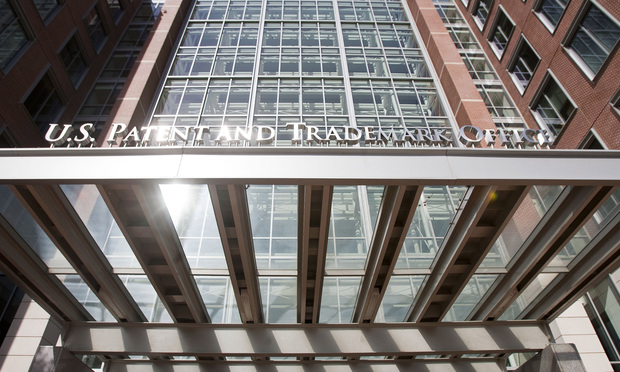Patent Owner Launches Takings Class Action in Wake of SCOTUS Ruling
Heninger Garrison Davis serves up a challenge to AIA proceedings that Justice Clarence Thomas refused to rule out.
May 11, 2018 at 05:26 PM
4 minute read
 U.S. Patent & Trademark Office. (Photo: Diego M. Radzinschi)
U.S. Patent & Trademark Office. (Photo: Diego M. Radzinschi) An Alabama law firm has launched a class action on behalf of patent owners who've lost claims during America Invents Act proceedings.
Birmingham-based Heninger Garrison Davis argues in Christy v. United States. that the U.S. Patent and Trademark Office is taking property without just compensation every time it cancels claims in a post-grant proceeding. The U.S. Supreme Court seemed to sketch out such a theory in its Oil States Energy Services v. Greene's Energy decision last month that turned away a broader constitutional challenge to inter partes review.
IPR is the system set up by the America Invents Act for the Patent Office to take a second look at previously issued patents. Thousands of patents have been partly or fully invalidated under the system since it was launched in 2012.
Thursday's complaint, signed by Heninger managing partner Timothy Davis, contends the PTO conceded liability by taking the position during Oil States that it uses IPRs to withdraw patents that never should have been issued in the first place.
“If this is the case, then the USPTO should never have collected (or be allowed to keep) any issuance fees or maintenance fees for any of the patents,” Davis writes. The PTO also must reimburse patent owners for attorney fees spent defending before the PTAB, plus any money plaintiffs invested in the patented invention, the complaint states.
➤➤ Want IP news that goes deeper? Geek out with Scott Graham's email briefing, Skilled in the Art. Sign up now.
Justice Clarence Thomas' 7-2 opinion in Oil States emphasized the narrowness of the decision. He said the court was not expressing an opinion on whether the PTO could reach back and cancel patents issued before the America Invents Act. And, he wrote, “Our decision should not be misconstrued as suggesting that patents are not property for purposes of the due process clause or the takings clause.”
The patent owned by name plaintiff Christy Inc. issued in 2006 and describes an “ambient air backflushed filter vacuum.” Black & Decker brought two IPRs that invalidated many of the patent claims based on obviousness and anticipation.
Along with takings in violation of the Fifth Amendment, Christy alleges breach of contract, breach of duty of good faith and fair dealing, unjust enrichment, and improper exaction of fees.
Ropes & Gray counsel Matthew Rizzolo, who predicted a takings suit in an article last week, says ordinary IPRs probably present the weakest taking claims, because the PTO has been re-examining patents for anticipation and obviousness since the 1980s. Covered business method reviews (CBMs), a procedure similar to IPR but where patents can be canceled for Section 101 eligibility or Section 112 indefiniteness, “have the most potential viability, because they represented a departure in substance from prior PTO proceedings,” Rizzolo says.
Rizzolo and University of Missouri School of Law professor Dennis Crouch, who blogged about the case Thursday, both describe the wide-ranging case as a long shot. The best chance of recovery, they suggest, is for issuance and maintenance fees.
Rizzolo sees one other potential flaw in the Christy patent as the vehicle: “It appears that the patent at issue had only 18 of its 20 claims ruled invalid in the IPRs,” he said. “So there is still some portion of the property right intact and to which the issue and maintenance fees apply.”
This content has been archived. It is available through our partners, LexisNexis® and Bloomberg Law.
To view this content, please continue to their sites.
Not a Lexis Subscriber?
Subscribe Now
Not a Bloomberg Law Subscriber?
Subscribe Now
NOT FOR REPRINT
© 2025 ALM Global, LLC, All Rights Reserved. Request academic re-use from www.copyright.com. All other uses, submit a request to [email protected]. For more information visit Asset & Logo Licensing.
You Might Like
View All
Buchalter Hires Longtime Sheppard Mullin Real Estate Partner as Practice Chair

Reality TV Couple and Pacific Palisades Neighbors Sue City of Los Angeles Over Loss of Homes to Fire
3 minute read
In Resolved Lawsuit, Jim Walden Alleged 'Retaliatory' Silencing by X of His Personal Social Media Account
Trending Stories
- 1No Two Wildfires Alike: Lawyers Take Different Legal Strategies in California
- 2Poop-Themed Dog Toy OK as Parody, but Still Tarnished Jack Daniel’s Brand, Court Says
- 3Meet the New President of NY's Association of Trial Court Jurists
- 4Lawyers' Phones Are Ringing: What Should Employers Do If ICE Raids Their Business?
- 5Freshfields Hires Ex-SEC Corporate Finance Director in Silicon Valley
Who Got The Work
J. Brugh Lower of Gibbons has entered an appearance for industrial equipment supplier Devco Corporation in a pending trademark infringement lawsuit. The suit, accusing the defendant of selling knock-off Graco products, was filed Dec. 18 in New Jersey District Court by Rivkin Radler on behalf of Graco Inc. and Graco Minnesota. The case, assigned to U.S. District Judge Zahid N. Quraishi, is 3:24-cv-11294, Graco Inc. et al v. Devco Corporation.
Who Got The Work
Rebecca Maller-Stein and Kent A. Yalowitz of Arnold & Porter Kaye Scholer have entered their appearances for Hanaco Venture Capital and its executives, Lior Prosor and David Frankel, in a pending securities lawsuit. The action, filed on Dec. 24 in New York Southern District Court by Zell, Aron & Co. on behalf of Goldeneye Advisors, accuses the defendants of negligently and fraudulently managing the plaintiff's $1 million investment. The case, assigned to U.S. District Judge Vernon S. Broderick, is 1:24-cv-09918, Goldeneye Advisors, LLC v. Hanaco Venture Capital, Ltd. et al.
Who Got The Work
Attorneys from A&O Shearman has stepped in as defense counsel for Toronto-Dominion Bank and other defendants in a pending securities class action. The suit, filed Dec. 11 in New York Southern District Court by Bleichmar Fonti & Auld, accuses the defendants of concealing the bank's 'pervasive' deficiencies in regards to its compliance with the Bank Secrecy Act and the quality of its anti-money laundering controls. The case, assigned to U.S. District Judge Arun Subramanian, is 1:24-cv-09445, Gonzalez v. The Toronto-Dominion Bank et al.
Who Got The Work
Crown Castle International, a Pennsylvania company providing shared communications infrastructure, has turned to Luke D. Wolf of Gordon Rees Scully Mansukhani to fend off a pending breach-of-contract lawsuit. The court action, filed Nov. 25 in Michigan Eastern District Court by Hooper Hathaway PC on behalf of The Town Residences LLC, accuses Crown Castle of failing to transfer approximately $30,000 in utility payments from T-Mobile in breach of a roof-top lease and assignment agreement. The case, assigned to U.S. District Judge Susan K. Declercq, is 2:24-cv-13131, The Town Residences LLC v. T-Mobile US, Inc. et al.
Who Got The Work
Wilfred P. Coronato and Daniel M. Schwartz of McCarter & English have stepped in as defense counsel to Electrolux Home Products Inc. in a pending product liability lawsuit. The court action, filed Nov. 26 in New York Eastern District Court by Poulos Lopiccolo PC and Nagel Rice LLP on behalf of David Stern, alleges that the defendant's refrigerators’ drawers and shelving repeatedly break and fall apart within months after purchase. The case, assigned to U.S. District Judge Joan M. Azrack, is 2:24-cv-08204, Stern v. Electrolux Home Products, Inc.
Featured Firms
Law Offices of Gary Martin Hays & Associates, P.C.
(470) 294-1674
Law Offices of Mark E. Salomone
(857) 444-6468
Smith & Hassler
(713) 739-1250







